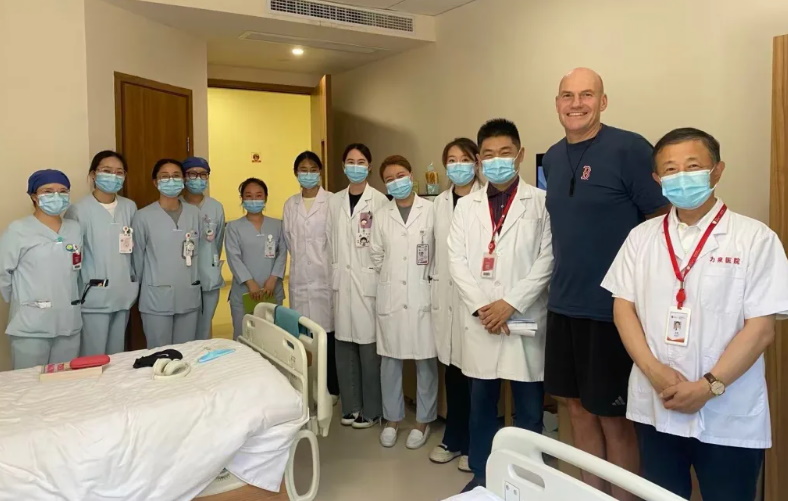Health
Former Police Officer Seeks Advanced Cancer Therapy in China

A former police officer is among several patients from New Zealand pursuing advanced cancer treatment abroad due to increasing wait times for conventional therapies at home. Stu Lye, who was diagnosed with a high-risk form of myeloma in 2018, travelled to China in May 2025 to undergo CAR T-cell therapy, a cutting-edge treatment that modifies a patient’s T cells to attack cancer cells. Lye has connected with at least four other New Zealanders receiving similar treatments in China, two of whom are now in complete remission.
Lye’s experience highlights the urgent need for improved access to cancer therapies in New Zealand. The Minister of Health, Simeon Brown, acknowledged that delays in standard stem cell treatments, also known as bone marrow transplants, have forced some patients into palliative care. “This is deeply concerning for me, and I understand how stressful this is for patients and their families,” Brown stated. In response to these challenges, Health New Zealand announced an additional $6 million in funding to enhance treatment access, with expectations for swift action.
Having undergone three stem cell treatments in New Zealand, Lye faced a relapse this year and found himself with limited options. He explained, “[In] Australia or the US you’re looking at close to $1 million, while in China it was more like $150,000, so that was the preferred option for me.” Despite not having sufficient funds initially, he successfully organized a fundraising campaign to cover the costs.
Lye’s situation is not unique. Many blood cancer patients in New Zealand have had to self-fund medications like daratumumab or travel abroad to access necessary treatments. During the election campaign, the National Party committed to addressing these treatment gaps, with leader Christopher Luxon promising that blood cancer patients would not be forgotten. Luxon emphasized the need for better access to treatments within New Zealand, allowing more patients to overcome cancer and return to their normal lives.
Despite the challenges, Lye’s treatment in China proved successful. He received his CAR T-cell therapy at Renji Hospital in Shanghai. He coordinated his treatment by consulting a professor of haematology who advised him to seek treatment upon relapse. “Within 10 days I was in a hospital bed in Renji Hospital, and we were there for seven weeks, five of which I was in hospital. It was wonderful. I had a dual CAR T that has put me in complete remission,” Lye recounted.
Lye advocates for New Zealand to collaborate with countries like China to improve access to advanced cancer treatments. He noted, “I don’t think New Zealand can keep pace with places like China because their level of investment and research is way beyond what we could ever dream of. We have to collaborate with places like China so we can use their technology without us having to learn that technology ourselves. That’s probably the only way forward.”
As New Zealand faces increasing demand for cancer treatments, the experiences of patients like Lye underscore the necessity for systemic changes in the healthcare system. Enhanced collaboration and investment in advanced therapies could pave the way for better outcomes for patients fighting blood cancers.
-

 World3 months ago
World3 months agoTest Your Knowledge: Take the Herald’s Afternoon Quiz Today
-

 Sports3 months ago
Sports3 months agoPM Faces Backlash from Fans During Netball Trophy Ceremony
-

 Lifestyle3 months ago
Lifestyle3 months agoDunedin Designers Win Top Award at Hokonui Fashion Event
-

 Sports3 months ago
Sports3 months agoLiam Lawson Launches New Era for Racing Bulls with Strong Start
-

 Lifestyle3 months ago
Lifestyle3 months agoDisney Fan Reveals Dress Code Tips for Park Visitors
-

 World4 months ago
World4 months agoCoalition Forms to Preserve Māori Wards in Hawke’s Bay
-

 Health3 months ago
Health3 months agoWalking Faster Offers Major Health Benefits for Older Adults
-

 Politics3 months ago
Politics3 months agoScots Rally with Humor and Music to Protest Trump’s Visit
-

 Top Stories4 months ago
Top Stories4 months agoUK and India Finalize Trade Deal to Boost Economic Ties
-

 Entertainment3 months ago
Entertainment3 months agoExperience the Excitement of ‘Chief of War’ in Oʻahu
-

 World4 months ago
World4 months agoHuntly Begins Water Pipe Flushing to Resolve Brown Water Issue
-

 Science4 months ago
Science4 months agoNew Interactive Map Reveals Wairarapa Valley’s Geological Secrets









